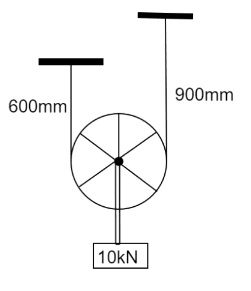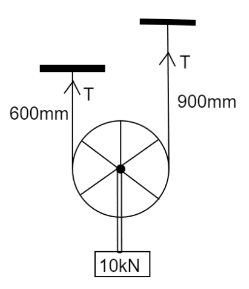Question
Question: A load of \( 10kN \) is supported from a pulley which in turn is supported by a rope of sectional ar...
A load of 10kN is supported from a pulley which in turn is supported by a rope of sectional area, 103mm2 and modulus of elasticity 103Nmm−2 , as shown in Fig. 5.18. Neglecting the friction at the pulley, then downward deflection of the load is

(A) 3.75
(B) 4.25
(C) 2.75
(D) 4.00
Solution
We can see in the given figure a single rope is attached on the two ends and there is downward force of 10kN . So tension will act upwards to balance the rope. And because of this tension there will be some extension in the given rope. Use the equation of equilibrium to find that extension.
Complete answer:
We have been given load F=10kN
Area of cross section A=103mm2
Modulus of elasticity y=103Nmm−2
Length of the rope l1=600mm and l2=900mm
Using equation of equilibrium we will get,

When a rope is holding the weight of an object at rest, the tension of the rope is equal to the weight of the object. On both the wire upward tension T is applied which will balance the downward force by mass of 10kN
Therefore, 2T−10=0
⇒T=5kN=5×103N
Now total extension is equal to the extension in the left part of the wire and the extension in the right part of the wire.
Extension=Δl1+Δl2
⇒Extension=AyTl1+AyTl2
⇒Extension=103×1035×103(600+900)
⇒Extension=7.5mm
This is the total extension in the wire so it will distribute equally in both the parts of the single wire
Therefore, 27.5mm
⇒3.75mm
Hence, option A) 3.75mm is the correct option.
Note:
We can also solve this problem by using the relation between stress, tension and area.
Longitudinal stress on the rope is given by
stress(σ)=area(A)tension(T)
σ=5mm2N
Now using the relation between extension in the rope, stress, modulus of elasticity (y) and length of rope.
extension=ystress×l
extension=27.5=3.75mm .
